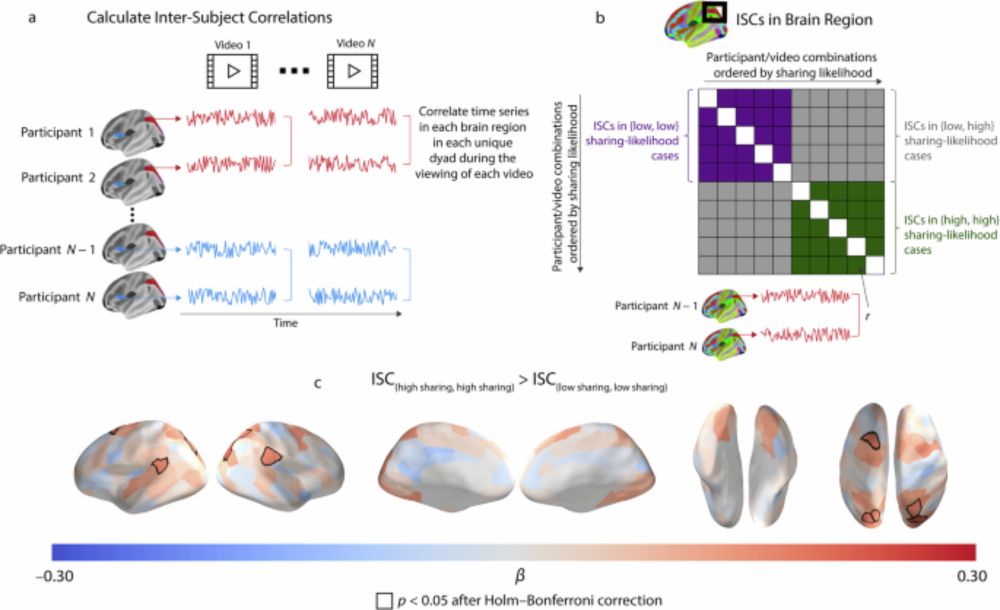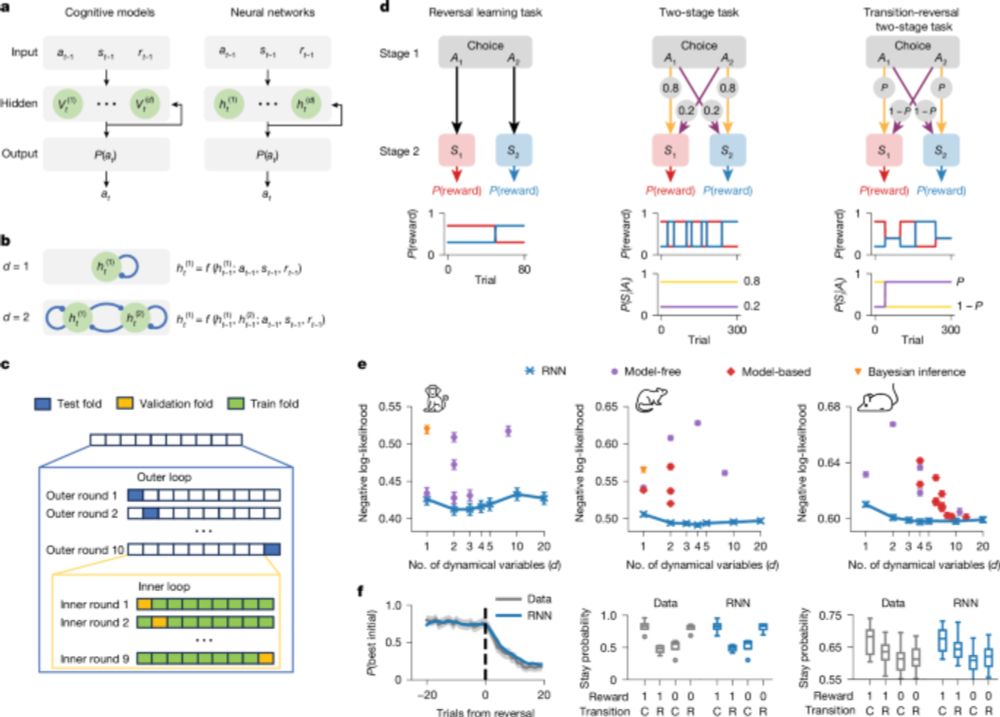PNAS
Proceedings of the National Academy of Sciences (PNAS), a peer reviewed journal of the National Academy of Sciences (NAS) - an authoritative source of high-impact, original research that broadly spans...
🔖 NEW PAPER ALERT 🔖 Out in PNAS – we used equation discovery algorithms to improve models of human reinforcement learning.
Led by the wonderful Kyle Lafollette with an amazing team Yanni Yuval @roeyschurr.bsky.social and @d-melnikoff.bsky.social
www.pnas.org/doi/epdf/10....
01.08.2025 07:20 — 👍 44 🔁 14 💬 0 📌 1
Job announcement 📢
@shawnrhoadsphd.bsky.social and I are looking for a joint postdoc interested in computational models of social interaction!
Interested? If you’ll be at #rlc2025 (or I missed you at #cogsci2025) feel free to reach out with any questions!
apply.interfolio.com/165809
04.08.2025 17:35 — 👍 24 🔁 16 💬 0 📌 0
#cogsci2025 #cpconf2025 #rldm2025 #rlc2025 #sne2025 #s4sn2025
31.07.2025 15:34 — 👍 0 🔁 0 💬 0 📌 0
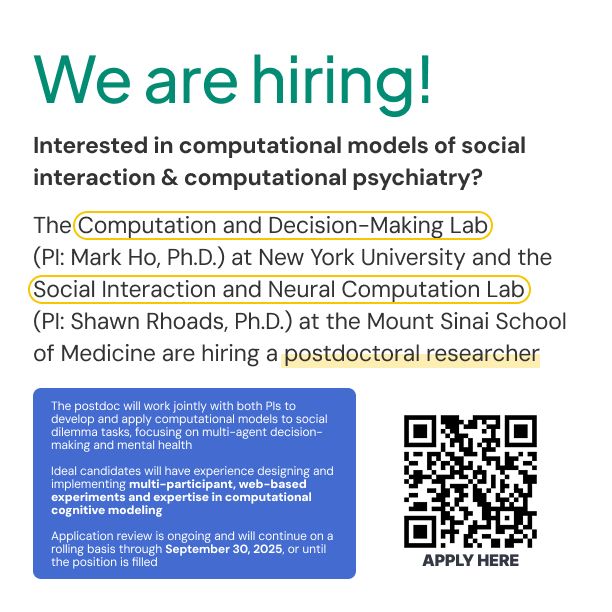
📢 @markkho.bsky.social & I are recruiting a joint postdoc interested in computational models of social interaction & mental health
💻 Ideal candidates have experience w/ multi-player web-based experiments & computational modeling
📅 Apps are reviewed on a rolling basis
🔗 apply.interfolio.com/165809
31.07.2025 15:34 — 👍 10 🔁 11 💬 1 📌 1
🥳Excited to share that our new paper is live at Psychological Science @psychscience.bsky.social! We show that Pavlovian learning can grow empathy for another person. 🧵👇
30.07.2025 00:35 — 👍 13 🔁 9 💬 2 📌 1
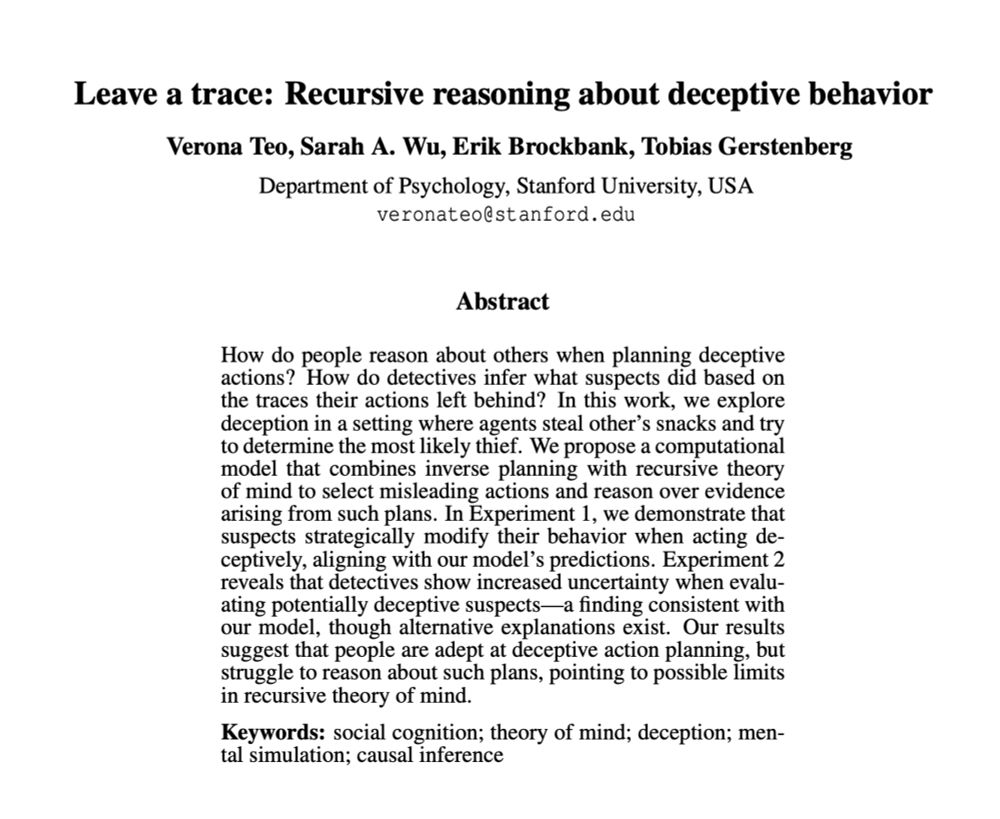
Excited to share our new work at #CogSci2025!
We explore how people plan deceptive actions, and how detectives try to see through the ruse and infer what really happened based on the traces left behind. 🕵️♀️
Paper: osf.io/preprints/osf/vqgz5_v1
Code: github.com/cicl-stanford/recursive_deception
1/
28.07.2025 19:11 — 👍 25 🔁 6 💬 1 📌 1
The manuscript resubmitted to different journals
25.07.2025 13:26 — 👍 475 🔁 39 💬 8 📌 6
Thrilled that our paper on the mechanisms underlying social learning strategies is out! First big paper from my @erc.europa.eu & @kawresearch.bsky.social funded group. More to come! I'm currently looking to recruit two post docs, get in touch if you find this line of research interesting.
23.07.2025 11:41 — 👍 61 🔁 28 💬 0 📌 3
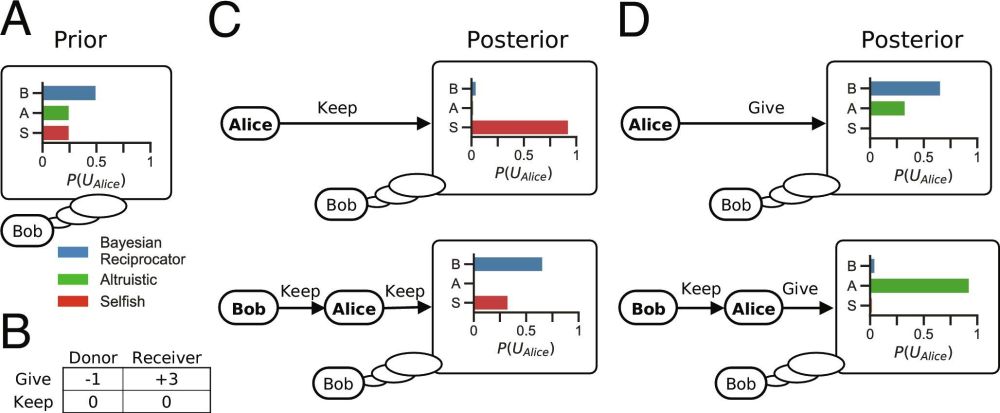
Evolving general cooperation with a Bayesian theory of mind | PNAS
Theories of the evolution of cooperation through reciprocity explain how unrelated
self-interested individuals can accomplish more together than th...
Our new paper is out in PNAS: "Evolving general cooperation with a Bayesian theory of mind"!
Humans are the ultimate cooperators. We coordinate on a scale and scope no other species (nor AI) can match. What makes this possible? 🧵
www.pnas.org/doi/10.1073/...
22.07.2025 06:03 — 👍 91 🔁 36 💬 2 📌 2
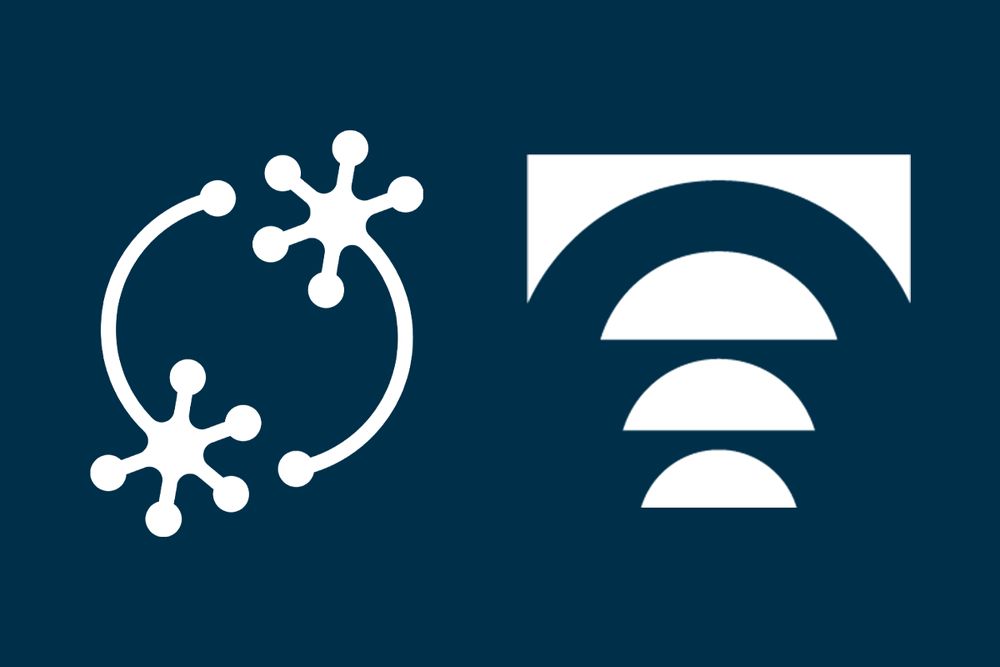
An exciting collaboration is underway. @thetransmitter.bsky.social is partnering with @neuromatch.bsky.social to serve the computational neuroscience community and help connect neuroscientists across all career stages.
www.thetransmitter.org/neuromatch-p...
#neuroskyence
18.07.2025 14:27 — 👍 73 🔁 22 💬 2 📌 0
CCN Lab
🚨 We’re hiring! The Computational Cognitive Neuroscience Lab at Virginia Tech is looking for a postdoc to join our team studying the neural + computational mechanisms of structure learning and flexible cognition: ccnvt.github.io#positions
10.07.2025 12:17 — 👍 28 🔁 19 💬 1 📌 1
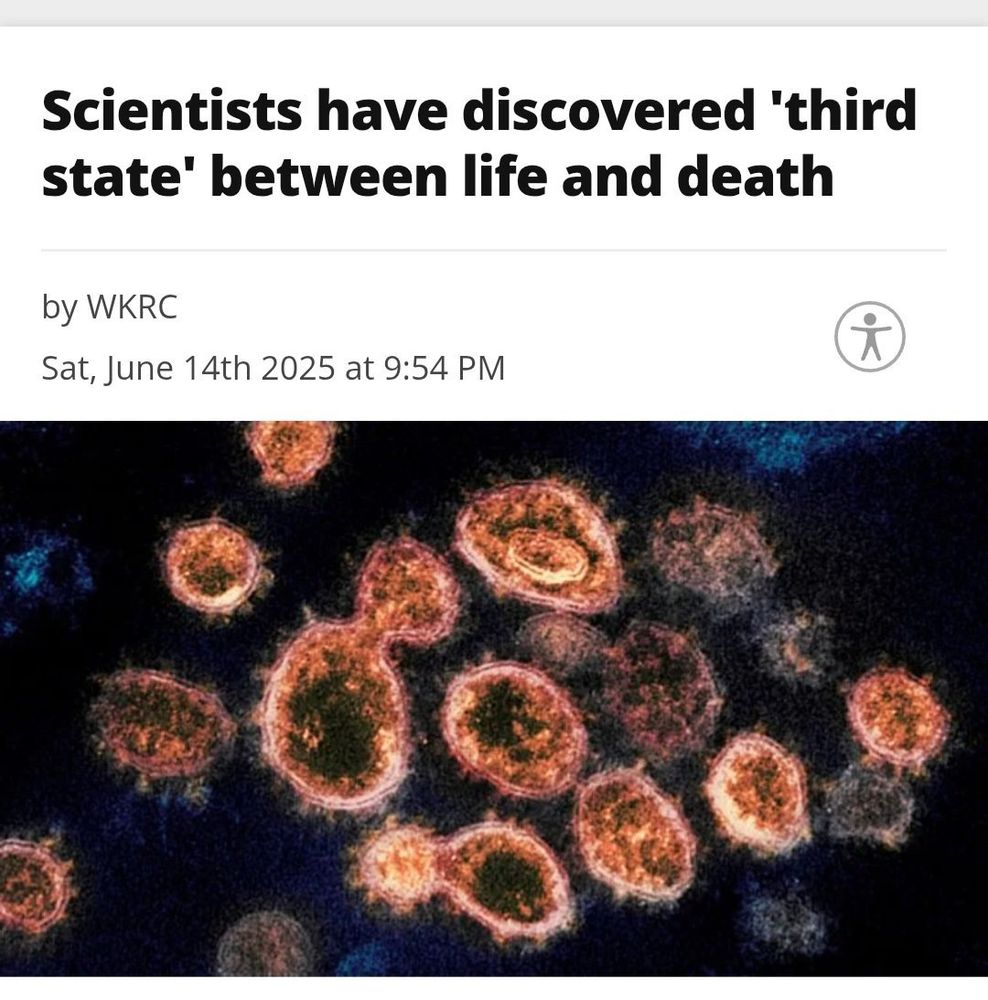
Pending editorial decision
07.07.2025 08:05 — 👍 161 🔁 20 💬 4 📌 5
A recently proposed «pseudosocial cognition approach» aims at our previous work on the social dimension of paranoia.
The shortcomings of their article raise important questions on how we all connect behavioural models to neural data.
Our letter of response: osf.io/preprints/ps...
summary 🧵👇
30.06.2025 07:01 — 👍 9 🔁 7 💬 3 📌 1
I have ANOTHER postdoc position open here: jobs.rutgers.edu/postings/250...
Please get in touch if you are interested in intracranial research into human cognition.
08.05.2025 16:40 — 👍 5 🔁 9 💬 0 📌 0
This just came out online - the prediction error story about delusions evolves and butts up against other accounts.
This came out too late for us to cite, but its entirely consistemt with our view of the mind and brain: www.jneurosci.org/content/45/2...
18.06.2025 13:01 — 👍 9 🔁 2 💬 1 📌 0
We're hiring a transcranial magnetic stimulation assistant. Ideally a recent grad looking to work for a few years in New York before applying to medical or graduate school. Ample opportunities for presenting and publishing data. If aware of any excellent candidates, please forward!
bit.ly/4l5wzcW
13.06.2025 16:20 — 👍 2 🔁 1 💬 0 📌 0
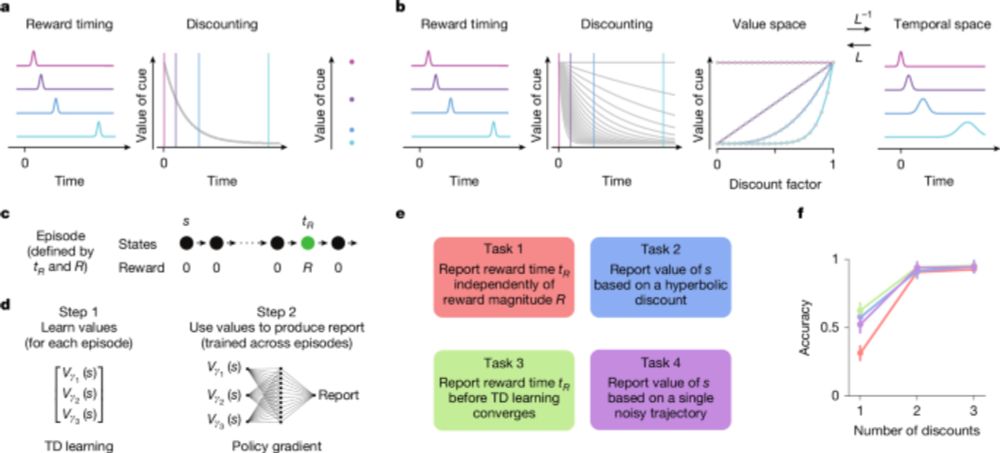
Multi-timescale reinforcement learning in the brain - Nature
Individual dopaminergic neurons encode future rewards over distinct temporal horizons.
Our work with Pablo Tano, @hyunggoo-kim.bsky.social Athar Malik, Alexandre Pouget and @naoshigeuchida.bsky.social exploring how dopamine neurons could enable multi-timescale reinforcement learning in the brain is out in @nature.com
www.nature.com/articles/s41...
04.06.2025 18:11 — 👍 107 🔁 45 💬 8 📌 2

Excited to share
@seoyeonbae211.bsky.social's first preprint—an ambitious global study of human motivation!
Using data from 900,000+ people in 100+ countries, we find altruistic motives consistently outweigh egoistic ones across cultures.
osf.io/preprints/ps...
03.06.2025 19:17 — 👍 8 🔁 4 💬 1 📌 0
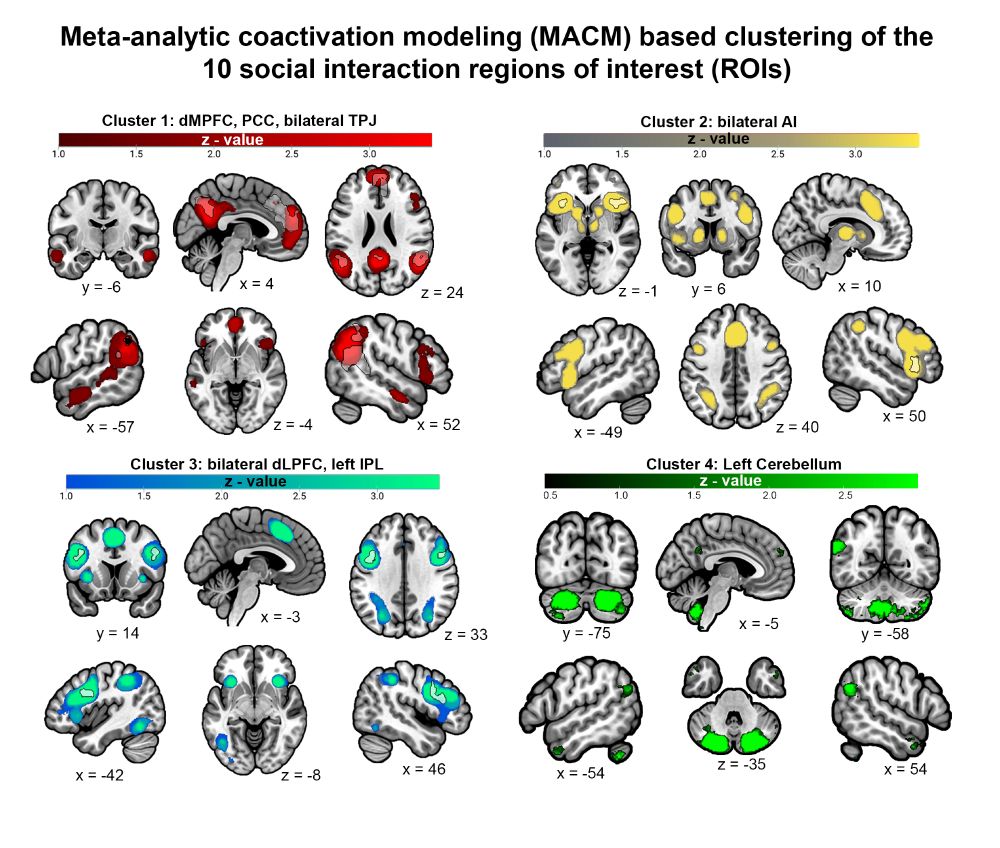
Merchant et al. perform a meta-analytic investigation of neurocognitive systems involved in real-time social interaction doi.org/10.52294/001...
@fmri-today.bsky.social @mallarchak.bsky.social @ohbmofficial.bsky.social
02.06.2025 14:27 — 👍 18 🔁 10 💬 0 📌 0
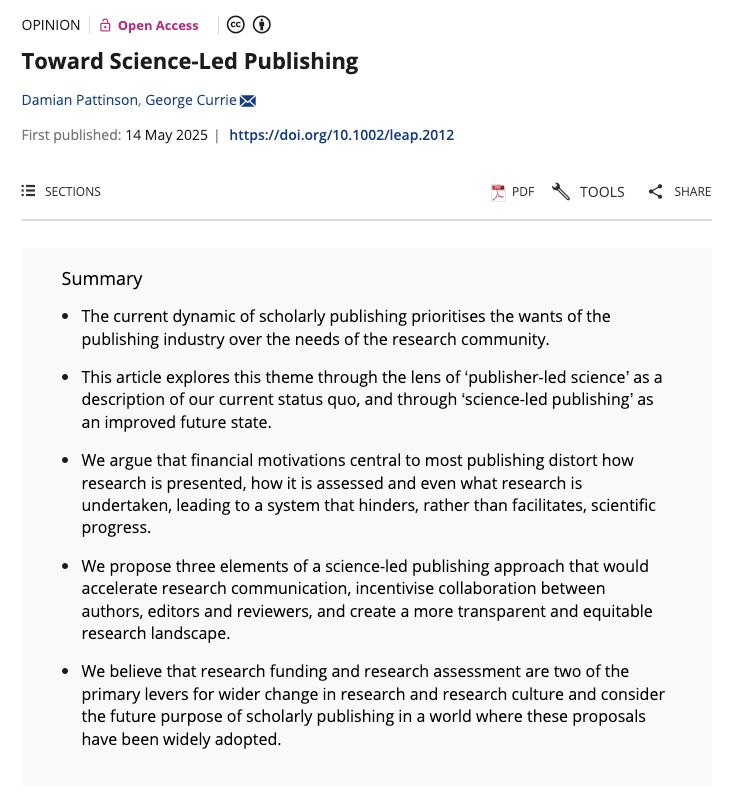
Screenshot of article summary of: Toward Science-Led Publishing
by Damian Pattinson, George Currie
published as an opinion piece, in Learned Publishing
Summary
The current dynamic of scholarly publishing prioritises the wants of the publishing industry over the needs of the research community.
This article explores this theme through the lens of ‘publisher-led science’ as a description of our current status quo, and through ‘science-led publishing’ as an improved future state.
We argue that financial motivations central to most publishing distort how research is presented, how it is assessed and even what research is undertaken, leading to a system that hinders, rather than facilitates, scientific progress.
We propose three elements of a science-led publishing approach that would accelerate research communication, incentivise collaboration between authors, editors and reviewers, and create a more transparent and equitable research landscape.
We believe that research funding and research assessment are two of the primary levers for wider change in research and research culture and consider the future purpose of scholarly publishing in a world where these proposals have been widely adopted.
Does publishing serve science or is science serving publishing?
Damian Pattinson and I (@elife.bsky.social) argue scientific publishing has evolved into a system that, rather than facilitate scholarly communication, distorts and dictates it.
onlinelibrary.wiley.com/doi/10.1002/...
#OpenScience
19.05.2025 14:52 — 👍 71 🔁 39 💬 4 📌 8
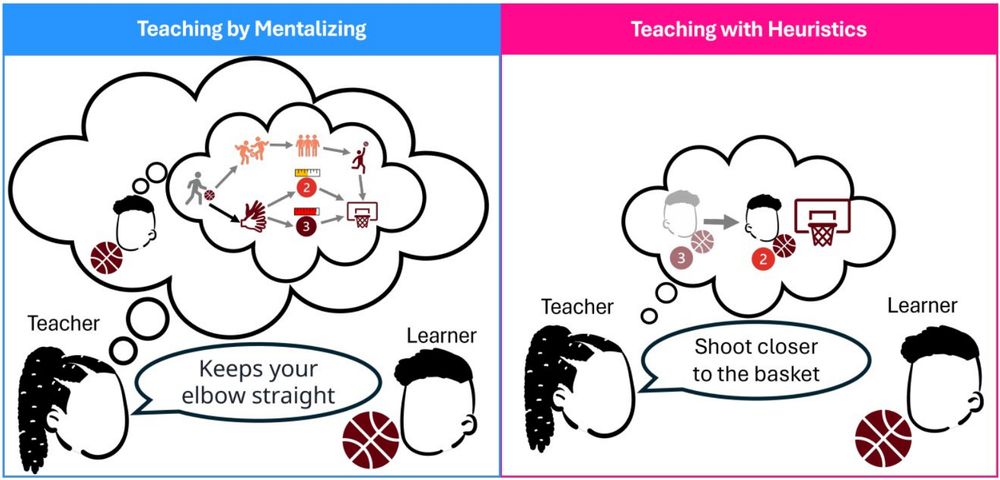
🚨 New preprint alert! 🚨
Thrilled to share new research on teaching!
Work supervised by
@cocoscilab.bsky.social, @yaelniv.bsky.social, and @markkho.bsky.social.
This project asks:
When do people teach by mentalizing vs with heuristics? 1/3
osf.io/preprints/os...
19.05.2025 18:44 — 👍 33 🔁 14 💬 2 📌 1
OSF
🧵New preprint!
Can experts accurately predict real-world effectiveness of 11 climate change interventions?
We ran a preregistered forecasting study with 862 participants and compared their predictions to real-world outcomes from 6,954 Americans.
What we found surprised us.
osf.io/preprints/ps...
16.05.2025 12:46 — 👍 15 🔁 3 💬 1 📌 3
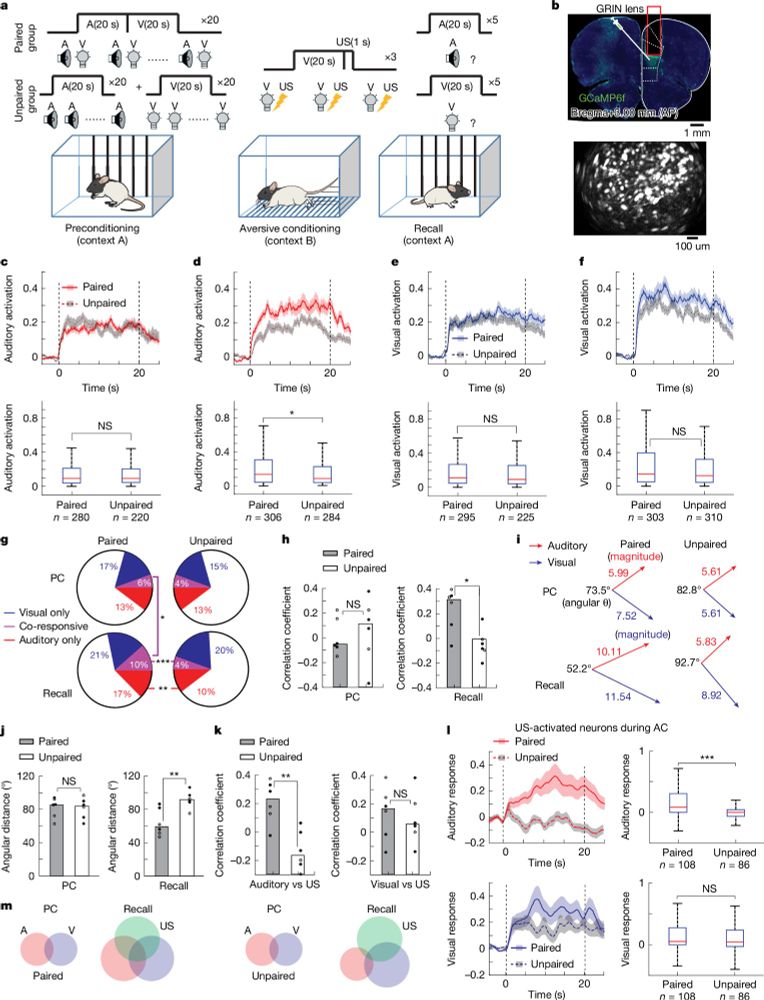
Prefrontal encoding of an internal model for emotional inference
Nature - Neurons in the rodent dorsomedial prefrontal cortex encode a flexible internal model of emotion by linking directly experienced and inferred associations with aversive experiences.
I’m excited to share a new paper from the lab. The study led by Xiaowei Gu reveals how the mPFC encodes complex emotional memories, using an internal model to infer emotional associations and memories via projections to the amygdala. a🧵(1/8)
rdcu.be/el19t
14.05.2025 23:35 — 👍 102 🔁 26 💬 10 📌 1
@cpsyjournal.bsky.social is switching to a paid peer reviewer system!!
Game changer for academic publishing 👏👏
cpsyjournal.org/articles/10....
15.05.2025 17:50 — 👍 5 🔁 2 💬 0 📌 0
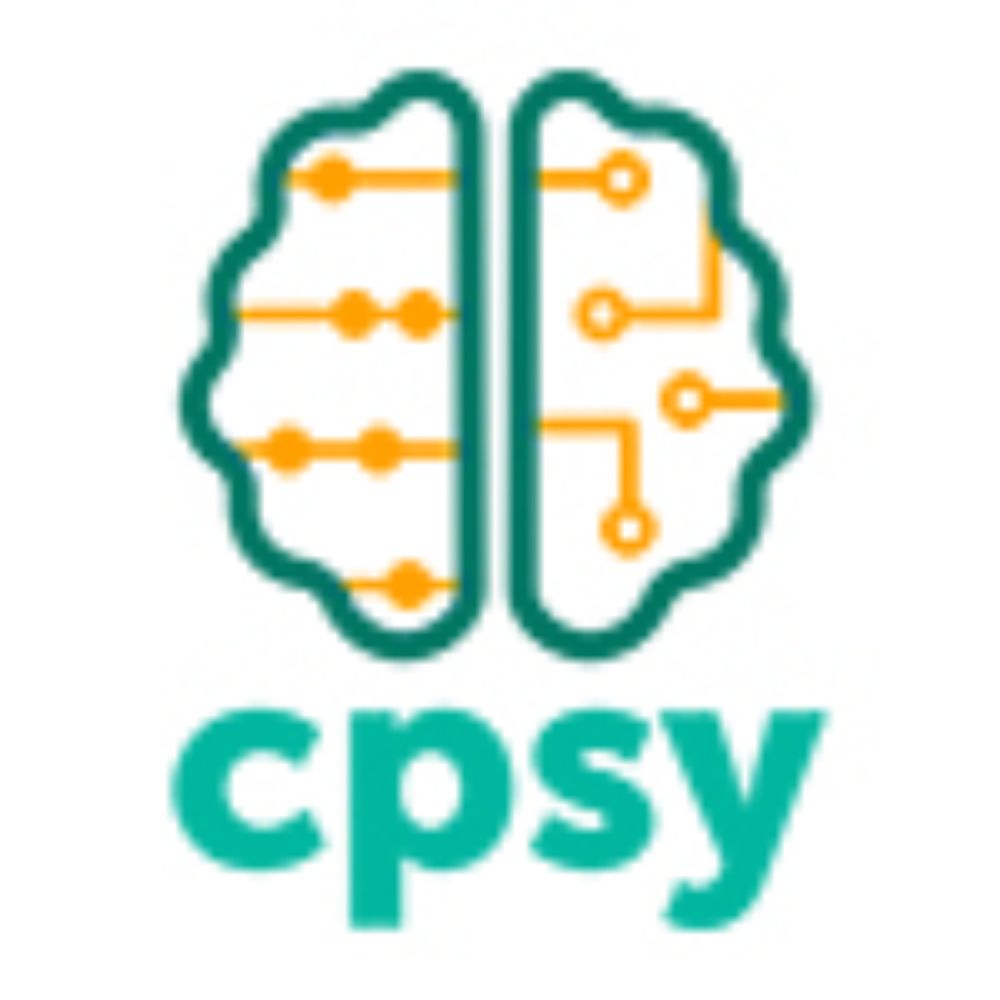
One Small Step Towards Fixing a Broken System | Computational Psychiatry
🔥💥📣 Excited to announce a new policy at the Computational Psychiatry (CPSY) journal @cpsyjournal.bsky.social. Starting from April 2025, CPSY will compensate reviewers for their time and effort invested in reviewing manuscripts. w/ @drrickadams.bsky.social
cpsyjournal.org/articles/10....
15.05.2025 14:09 — 👍 27 🔁 12 💬 1 📌 2
Re-posting is appreciated: We have a fully funded PhD position in CMC lab @cmc-lab.bsky.social (at @tudresden_de). You can use forms.gle/qiAv5NZ871kv... to send your application and find more information. Deadline is April 30. Find more about CMC lab: cmclab.org and email me if you have questions.
20.02.2025 14:50 — 👍 77 🔁 89 💬 3 📌 8
Thanks so much for the kind words and for highlighting our work! :)
26.04.2025 22:02 — 👍 0 🔁 0 💬 0 📌 0
Associate Professor @ ISMMS
Director, Center for Computational Psychiatry
Psychologist & neuroscientist using computational models, neuroimaging, & EMA to study learning, decision-making, & control in eating pathology & related conditions
Developmental psych & cog neuro, studying how babies and kids make sense of and learn from their social world. Asst Prof @ UCSD. she/her
into brain evolution & development, open science, art & science https://www.youtube.com/watch?v=6hMNZHsrNHw, music, making, javascript, contemporary dance https://www.youtube.com/watch?v=OZfHj7F2FzQ
website: katjaq.github.io
postdoc with Marcelo Mattar - https://carlos.correa.me/
Post-doctoral researcher at Karolinska Institute. I study social cognition and social learning using a mix of experiments, computational models and simulations.
professor at university of washington and founder at csm.ai. computational cognitive scientist. working on social and artificial intelligence and alignment.
http://faculty.washington.edu/maxkw/
Doctoral student @ox.ac.uk and Member of Social Computation and Representation Lab - https://www.socrlab.net/people
Social Scientist | Critical & Decolonial Psychologist | Fighting for Environmental Justice | Views are my own
Information and updates about RLC 2025 at the University of Alberta from Aug. 5th to 8th!
https://rl-conference.cc
Assistant Professor and Lab Lead of Cognitive Network Modelling cognemo.com
@CAMHResearch
#KrembilNeuroinformatics. Computational psychiatry
Cognitive neuroscientist exploring how the brain learns, decides, and generalizes. 🧠 http://ccnvt.github.io
Assistant Professor of Radiology at Washington University in St. Louis. Neuroscientist studying human brain organization with fMRI, functional connectivity, and DTI.
https://sites.wustl.edu/evangordon/
Neuroscience PhD Candidate @sinaibrain.bsky.social | she/her
Assemblymember. Democratic Nominee for Mayor of NYC. Running to freeze the rent, make buses fast + free, and deliver universal childcare. Democratic Socialist. zohranfornyc.com
Running for Congress (IL-09) because we deserve Democrats who actually do something | katforillinois.com
Senior Research Fellow @ ucl.ac.uk/gatsby & sainsburywellcome.org
{learning, representations, structure} in 🧠💭🤖
my work 🤓: eringrant.github.io
not active: sigmoid.social/@eringrant @eringrant@sigmoid.social, twitter.com/ermgrant @ermgrant
Half old lady, half baby. Fiction editor at TriQuarterly; stories in STORY, Santa Monica Review, and more. Novel in-progress. www.emirengoff.com
PhD Candidate at Princeton University. Studying how people and machines teach.







